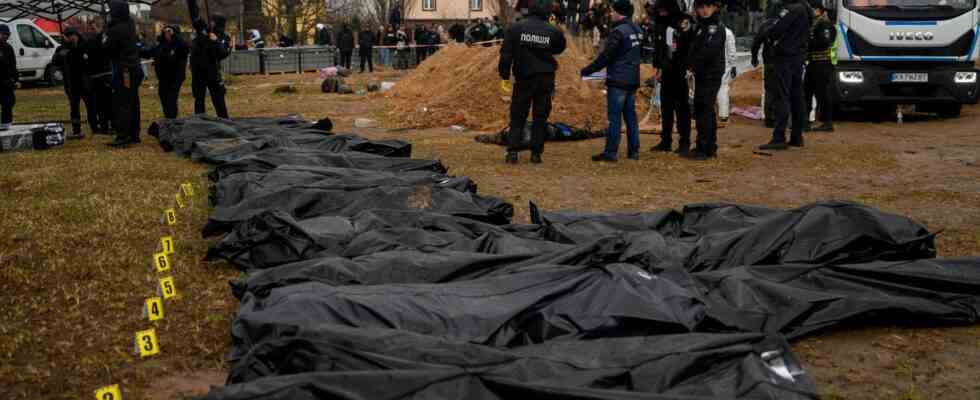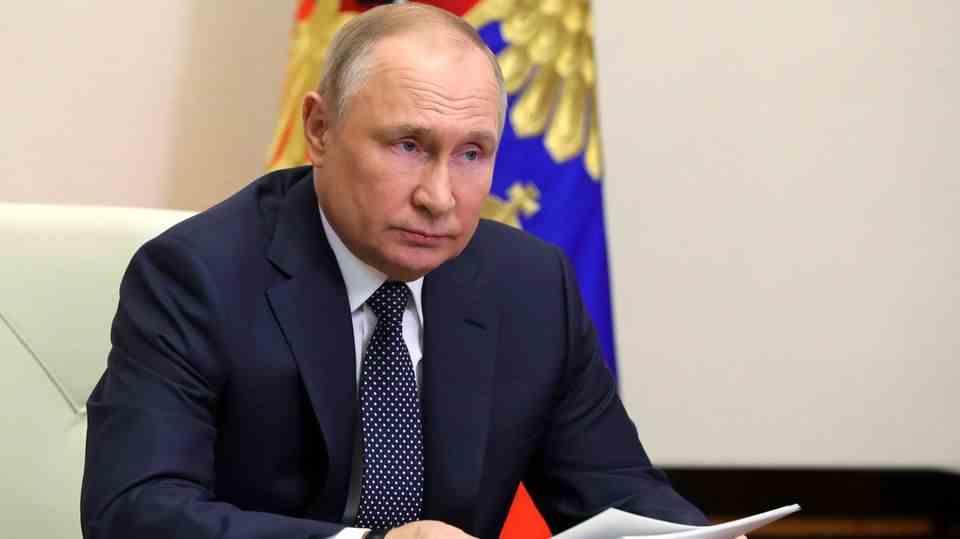allegation by the United States
How do you define genocide? And is Russia actually committing genocide in Ukraine?
Bodies of killed civilians lie in black sacks in Bucha on the outskirts of Kyiv. Is Russia committing genocide in Ukraine?
© Valeria Ferraro/Zuma Press Wire/DPA
US President Joe Biden has accused Russia of genocide over the war atrocities in Ukraine. Is he right? And what is actually the definition of the criminal offense of “genocide” under international law?
With the accusation of genocide, US President Joe Biden has reignited the debate on the classification of the Russian war of aggression against Ukraine. He accused Russian President Vladimir Putin of genocide for the first time on Tuesday: “It is becoming increasingly clear that Putin is trying to erase the very idea of being Ukrainian.” The comments met with a mixed response, as there is disagreement as to when atrocities can be classified as genocide.
The previous attitude of the US government
So far, the US government has not spoken of genocide in relation to Ukraine. Biden himself said at the beginning of last week when asked whether one could speak of genocide after the atrocities committed against civilians in the Kiev suburb of Bucha: “No, I think it’s a war crime.”
His National Security Adviser, Jake Sullivan, said shortly thereafter: “We have seen atrocities, we have seen war crimes. We have not yet seen a scale of systematic deprivation of life from the Ukrainian people that approaches the scale of genocide.” However, this assessment could change at any time. After Biden’s comments, the US State Department initially did not respond to a request as to whether the US was now officially accusing Russia of genocide.
The definition of genocide
The term is relatively new in legal terms. As a result of the Holocaust, the United Nations (UN) General Assembly passed the “Convention on the Prevention and Punishment of the Crime of Genocide” in December 1948. With the convention that came into force in January 1951, genocide became a criminal offense under international law.
Lawyers have been arguing about how narrowly the term genocide should be defined ever since it was introduced into international criminal law. According to Article 2 of the UN Convention, it is a crime against humanity “committed with intent to destroy, in whole or in part, any national, ethnic, racial or religious group”.
It is not just about the “killing of members of the group”, but also about the “infliction of serious physical or mental harm on members of the group”, the prevention of births within a group, the kidnapping of their children into another group and the willful deterioration of living conditions. Even if the term genocide is reminiscent of the millions of murders committed by the Nazi regime, according to the convention the number of victims is irrelevant.
With the ratification, the UN members have committed themselves to preventing and punishing crimes of this kind. Nevertheless, further genocides could not be prevented – for example the crimes committed by Hutu militias against hundreds of thousands of Tutsi in Rwanda (April 1994) or in Europe the massacre committed by Serbs against Bosnian Muslims in Srebrenica (July 1995). Most recently, in March 2022, the United States formally classified the atrocities committed against the Rohingya Muslim minority in Myanmar as genocide.
Political debates about the classification of genocides
The classification of atrocities as genocide is not only a legal but also a political question – and the term is extremely emotionally charged. There has long been a dispute as to whether the massacres of Armenians during the First World War can be classified as genocide. The Bundestag did so in 2016, sparking a serious diplomatic crisis with Turkey. The US only followed last year with a statement from President Biden.
The Bucha horror: the brutal reality of war
15 images
Under Biden’s predecessor Donald Trump, the US government officially accused China of genocide against the Muslim Uyghur minority in early 2021. Critics complained that this classification a few days before the end of Trump’s term in office was primarily politically motivated – under Trump, relations between Washington and Beijing had deteriorated significantly. Most recently, in March, the USA officially classified the violence perpetrated by the military in Myanmar against the Rohingya minority as genocide.
The Russian War of Aggression and the Question of Genocide
The exact classification of the Russian action against Ukraine is difficult. “The brutality of killings in itself is not sufficient to establish genocide,” Yale University political scientist David Simon told AFP. Rather, the “intention” to destroy a certain group in whole or in part is central. Determining this in the Russian war against Ukraine is “complicated”.
“Moscow’s rhetoric makes no secret of the fact that the existence, and thus the right to exist, of Ukrainian nationality is being denied,” says Simon. “But do you also dispute the Ukrainians’ right to exist as a people or just their right to see themselves as Ukrainians?” According to the genocide expert, the latter would not be covered by the international law convention.
At the same time, Simon and other experts point to the blanket description of Ukrainians as Nazis or neo-Nazis by the Russian media and Putin’s announcement that he wants to “denazify” Ukraine. This could form the rhetorical basis for genocide.
Reactions to Biden’s genocidal remarks
While Ukrainian President Volodymyr Zelenskyy immediately welcomed Biden’s “true words”, the Kremlin dismissed the statement as “unacceptable”. The US President’s statement also met with a mixed response in Western countries. France’s head of state, Emmanuel Macron, warned that an “escalation of words” is not necessarily effective. Chancellor Olaf Scholz (SPD) did not want to directly agree with Biden’s assessment and spoke of “war crimes”.
Canada’s Prime Minister Justin Trudeau, on the other hand, backed Biden: With regard to Russia’s attack on Ukraine, it was “absolutely correct” to speak of genocide.



